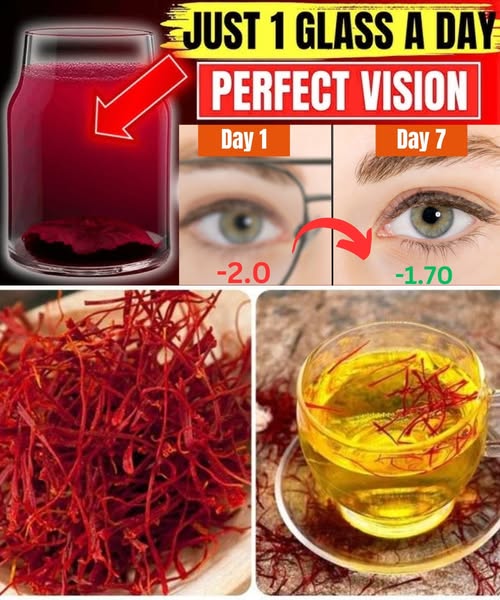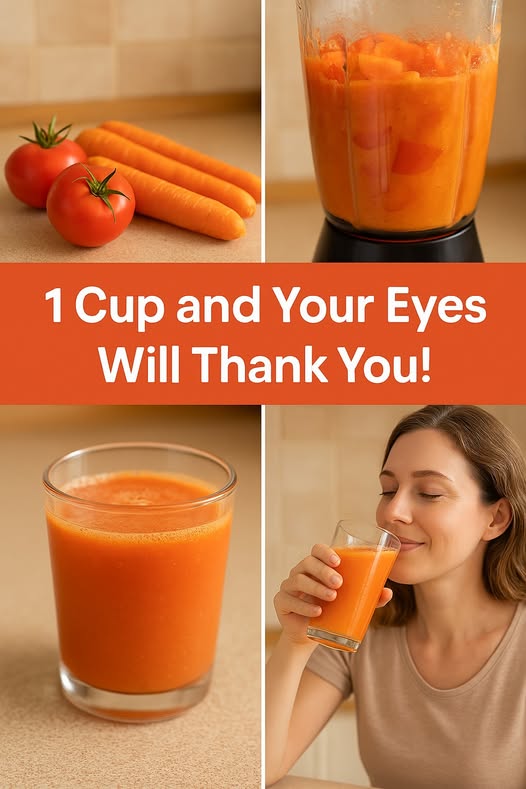Introduction: See Clearly Again—Naturally

Poor vision is one of the most common health concerns in the modern world. Over 2.2 billion people globally suffer from vision impairment or blindness, according to the World Health Organization. But what if there was a simple, natural, and affordable solution hiding in your kitchen that could dramatically improve your eye health?
In this blog post, we’ll uncover one powerful ingredient that’s been scientifically linked to sharper vision, healthier eyes, and even reduced risk of age-related vision problems. Whether you’re battling blurry vision, eye strain, or declining night vision, this article is your actionable guide to improving eyesight naturally—without the need for expensive glasses, surgery, or supplements.
The One Ingredient That Could Change Your Vision: Carrots
Yes, carrots—a humble, crunchy root vegetable—are loaded with vision-enhancing nutrients. While it may sound too simple to be effective, carrots have stood the test of time in both folk remedies and modern nutritional science.
Let’s break down why this one food is your eye’s best friend.
Why Carrots? The Nutrient That Makes All the Difference
Carrots are rich in beta-carotene, a type of provitamin A that your body converts into vitamin A, an essential nutrient for maintaining healthy vision.
Here’s why vitamin A is vital:
- It helps maintain the surface tissues of the eyes (the cornea and conjunctiva).
- It forms rhodopsin, a protein in the eyes that allows you to see in low light.
- It reduces the risk of xerophthalmia, a severe condition that can lead to blindness.
According to the National Institutes of Health, just one medium carrot provides 200% of your daily vitamin A needs. That’s powerful!
Top 5 Eye Health Benefits of Carrots
- Boosts Night Vision
Carrots enhance your ability to see in dim lighting. A lack of vitamin A leads to night blindness—a dangerous condition, especially for driving. - Prevents Age-Related Macular Degeneration (AMD)
A study published in JAMA Ophthalmology revealed that a high intake of vitamin A and antioxidants significantly reduces the risk of AMD, a leading cause of vision loss in people over 50. - Protects Against Cataracts
The antioxidants in carrots combat oxidative stress in the lens of the eye—one of the main contributors to cataract formation. - Reduces Digital Eye Strain
In today’s digital age, most of us spend 7–10 hours in front of screens. Carotenoids like lutein and zeaxanthin in carrots filter harmful blue light and reduce inflammation. - Supports Overall Eye Structure
Vitamin A helps maintain healthy cell membranes in the eyes and supports tear production, reducing dry eyes and irritation.
How to Incorporate Carrots Into Your Daily Routine
You don’t have to crunch raw carrots all day. Here are 5 practical and delicious ways to consume more carrots and reap their vision-boosting benefits:
- Carrot Smoothie
Blend carrots with oranges, ginger, and a dash of turmeric for a refreshing morning drink. - Roasted Carrot Fries
Swap out regular fries for baked carrot sticks seasoned with paprika and garlic powder. - Carrot Soup
A warm, creamy carrot soup with coconut milk is both nourishing and satisfying. - Raw with Hummus
A quick snack that’s both crunchy and full of protein. - Carrot Juice
Freshly juiced carrots deliver concentrated beta-carotene in minutes. Add apples for sweetness.
FAQs: Everything You Want to Know About Carrots and Vision
Q1: Can eating carrots actually improve my eyesight?
Yes, but with conditions. Carrots help maintain and protect vision by preventing vitamin A deficiency. They don’t restore vision lost due to genetic or structural problems but can improve the quality of your current sight.
Q2: How many carrots should I eat per day for eye health?
Just one medium carrot provides twice the daily recommended vitamin A. Eating 1–2 carrots per day is a good baseline for eye health.
Q3: Are baby carrots as effective as regular carrots?
Absolutely. Baby carrots are just cut and peeled regular carrots. Nutritionally, they are the same.
Q4: Is it possible to overdose on vitamin A from carrots?
Not from carrots alone. Carotenoids (like beta-carotene) are water-soluble, and excess amounts are excreted. However, overconsumption may cause carotenemia—a harmless condition where your skin turns orange.
Q5: Are there other foods that help eyesight?
Yes. Foods rich in omega-3 fatty acids, vitamin C, zinc, and lutein/zeaxanthin (like spinach, salmon, eggs, and oranges) also promote eye health.
The Science Behind It: Studies That Prove It Works
- Harvard School of Public Health states that high beta-carotene intake reduces the risk of AMD by 25%.
- National Eye Institute’s AREDS study found that a formula high in antioxidants (including vitamin A) reduces the progression of advanced age-related macular degeneration by 25%.
- A 2013 study in Nutrients Journal concluded that diets rich in carotenoids improve retinal health and visual performance.
This evidence reinforces that carrots aren’t just folklore—they’re fact.
Common Vision Problems Carrots Can Help With
| Vision Issue | How Carrots Help |
|---|---|
| Night Blindness | Enhances rhodopsin production |
| Dry Eyes | Supports tear gland health |
| Blurry Vision | Reduces inflammation |
| Digital Eye Fatigue | Filters blue light with lutein |
| Age-Related Decline | Antioxidants combat oxidative stress |
The Cost-Saving Power of Natural Vision Remedies
Did you know Americans spend over $34 billion annually on vision care? From glasses to surgery, the costs are staggering. Carrots offer a low-cost, low-risk alternative to maintain your vision and avoid expensive interventions.
For less than $1 a day, you can fuel your body with a nutrient that dramatically supports your long-term eye health.
Eye-Opening Testimonials: Real Stories from Real People
Emma, 42, Graphic Designer:
“After months of dry, irritated eyes from computer work, I started drinking carrot juice daily. Within two weeks, my eye fatigue reduced drastically. It’s now part of my morning ritual!”
Carlos, 58, Retired Engineer:
“My optometrist said my risk for AMD was high due to family history. I made carrots a staple in my meals. Two years later, my eye scans showed no degeneration. It’s my secret weapon.”
Bonus: Carrot + Olive Oil = Absorption Powerhouse
Vitamin A is fat-soluble, meaning it absorbs better with fat. Drizzle carrots with olive oil, or enjoy them with avocado or nuts for maximum nutrient uptake.
This simple trick could multiply the benefits you get from each serving.
Why You Should Start Today
The longer you delay, the more your eyes are exposed to:
- UV radiation
- Digital screen damage
- Oxidative stress
- Nutritional deficiency
By starting today, you’re giving your eyes the building blocks they need to heal, strengthen, and thrive.
Conclusion: Sharper Vision Starts with a Simple Step
When it comes to protecting your vision, you don’t always need fancy supplements or costly eye drops. Sometimes, the solution is right in front of you. One carrot a day can truly help keep the optometrist away.
Don’t wait for vision problems to escalate. Take control today by integrating this one powerhouse food into your routine. It’s simple, proven, affordable—and your eyes will thank you.


